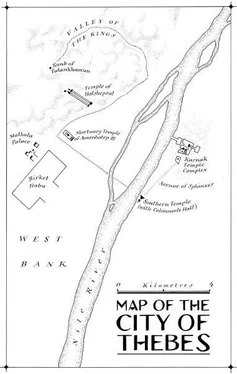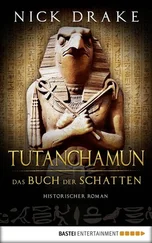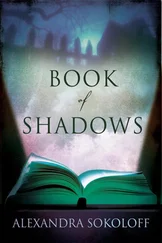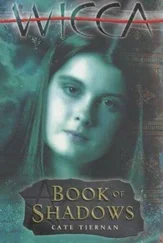Nick Drake - Tutankhamun - The Book of Shadows
Здесь есть возможность читать онлайн «Nick Drake - Tutankhamun - The Book of Shadows» весь текст электронной книги совершенно бесплатно (целиком полную версию без сокращений). В некоторых случаях можно слушать аудио, скачать через торрент в формате fb2 и присутствует краткое содержание. Жанр: Исторический детектив, на английском языке. Описание произведения, (предисловие) а так же отзывы посетителей доступны на портале библиотеки ЛибКат.
- Название:Tutankhamun: The Book of Shadows
- Автор:
- Жанр:
- Год:неизвестен
- ISBN:нет данных
- Рейтинг книги:4 / 5. Голосов: 1
-
Избранное:Добавить в избранное
- Отзывы:
-
Ваша оценка:
- 80
- 1
- 2
- 3
- 4
- 5
Tutankhamun: The Book of Shadows: краткое содержание, описание и аннотация
Предлагаем к чтению аннотацию, описание, краткое содержание или предисловие (зависит от того, что написал сам автор книги «Tutankhamun: The Book of Shadows»). Если вы не нашли необходимую информацию о книге — напишите в комментариях, мы постараемся отыскать её.
Tutankhamun: The Book of Shadows — читать онлайн бесплатно полную книгу (весь текст) целиком
Ниже представлен текст книги, разбитый по страницам. Система сохранения места последней прочитанной страницы, позволяет с удобством читать онлайн бесплатно книгу «Tutankhamun: The Book of Shadows», без необходимости каждый раз заново искать на чём Вы остановились. Поставьте закладку, и сможете в любой момент перейти на страницу, на которой закончили чтение.
Интервал:
Закладка:
Then I turned and walked quickly away, knowing with these words I was risking my future for the sake of my contempt, but hating him too much to care.
17
As I left the temple gate, Khety appeared suddenly out of the crowds assembled behind the security lines.
‘Come quickly,’ he said, breathlessly.
‘Another victim?’
He nodded.
‘But this time the killer was disturbed at his work. Hurry.’
I hesitated. I was supposed to attend the interviews of all those who had access to the royal quarters, with Simut. But I knew I had no choice.
We ran through the crowds to reach the house, which was in a distant quarter of the city. Everything and everyone moved too slowly; people turned or stopped right in our tracks, mules loaded with mud-bricks or rubbish or vegetables blocked narrow passages; all the old people of the city seemed to be taking for ever to cross the ways-so we dodged and darted, shouting for precedence, pushing and throwing fools, workmen, officials and children aside, leaving a wake of aggravation and disturbance behind us.
The young man lay on his couch. He was about the same age as the first boy, and with a similar infirmity. The bones of his body had been shattered as well. His skin was horribly bruised from the attack. But this time, over his head, the killer had fitted the scalp, the long, black, dull hair, and the now-distorted face, like a leather mask that had melted in great heat, which must have belonged to the young girl. The cut edges of the skin of her face had been sewn around the top of the boy’s own face with an exemplary precision-but he had not had time to finish his gruesome work. The dead girl’s lips, dried out and curling up, opened around the small, dark hole which would once have been her mouth. I put my ear carefully to it. And then I heard it: the faintest respiration, slight as a feather brushing my face.
Very carefully, very gently, and as quickly as possible, I used my knife to snip away at the stitches and eventually, carefully removed the hideous mask. Sticky fluids and traces of blood had helped the girl’s face adhere to the boy’s, and I had to tease it off; the two faces peeled apart reluctantly. His own face was very pale, as if bloodless, and embroidered now with spots of blood that sprang from the killer’s needlework. More terribly, where his eyes should have been were empty, bleeding sockets. I passed Khety the girl’s face, for even in this lamentable state it was still an identity-something to go on.
Then suddenly the boy drew a tiny inward breath, more like a small cry. He tried to move, but the shattered bones made no sense; and then a flash of pain arched through him.
‘Try to stay still. I am a friend. Who did this to you?’
But he could not speak, for the bones of his jaw were broken.
‘Was it a man?’
He struggled to comprehend me.
‘A young man or an old man?’
He was trembling now.
‘Did he give you a powder or a juice to ingest?’
Khety touched my shoulder.
‘He cannot understand you.’
Now the boy began to moan, a low, mournful sound like an animal in appalling distress. He was suffering the memory of what had happened to him. Drawing breath seemed suddenly impossibly painful. Instinctively I touched his hand with mine, but the moan became a terrible wail of pain. Desperate for him not to die, I moistened his lips and brow with a little water. This seemed to revive him. He opened his mouth a fraction, as if pleading for more water, which I gave him. But then he slipped from consciousness. Horrified, I leant down to listen again at his mouth and heard-thanks be to the Gods-the lightest of breath. He was still alive.
‘Khety-we need a doctor. Now!’
‘But I don’t know any doctors,’ he stammered.
I racked my brains. And then suddenly it came to me.
‘Quickly, we have to carry him to Nakht’s house. We don’t have much time.’
‘But how…?’ he began, his palms waving uselessly in the air.
‘On his bed, you idiot, how else?’ I shouted back at him. ‘I want him kept alive, and Nakht can do it.’
And so, to the amazement of the boy’s family, I covered the boy’s body with a linen cloth as if he was already dead, and the two of us took up the bed-which was light enough, and his frail weight added very little to our burden-and made our way through the streets. I went first, shouting at everyone to make way, and trying to ignore the curious faces of the people, all pushing to get a glimpse of what we were carrying, and what was causing such a stir. But when they saw the linen over the body they assumed we carried a corpse, and backed away, losing interest quickly. Their reaction was very different to Nakht’s, when I revealed the damaged body beneath the cloth to him. Khety and I were drenched in sweat, and desperate for a long draught of cool water; but my priority was the boy. I had not dared to check on his state in the street, only praying that the inevitable rocking and jostling of the bed in our hands would not cause him too much agony. I hoped he was only unconscious, but not, please the Gods, already in the Otherworld.
Nakht ordered the servants to carry the boy into one of his chambers, and then he examined him carefully. Khety and I watched him nervously. Once he had concluded, he washed his hands in a bowl, and nodded sternly to us to join him outside.
‘I have to confess, my friend, this is the strangest gift you have ever brought me. What have I done to deserve it? A boy’s lame body, the bones shattered, the face so curiously scored by needle-holes, and the eyes removed? I am at a loss, a complete loss, to understand whatever persuaded you to bring him to me, like a cat bringing home the remains of her kill…’
He was angry. And so, I realized, was I.
‘And to whom else should I bring him? Without expert attention he will die. But I have to keep him safely, until he is well. He is my only lead. Only he can tell me who did this to him. He might be able to help us identify his attacker. He will recover?’
‘He has a dislocated jaw. His arms and legs are both broken in several places. I fear infection in the cuts around his face and in the eye-sockets. And among all the great mysteries of the cruelties that have been so precisely inflicted upon this boy’s body, why does he have the marks of needles upon his face?’
I pulled the girl’s face from my bag and showed it to him. He turned away in revulsion.
‘We found this sewn on to his face. It belongs to a body we also found. The face belongs to a girl. Her name was Neferet.’
‘Please, put that thing away. I simply can’t talk to you while you are thrusting the remains of a human face at me,’ he cried.
I saw his point. I passed the face to Khety, who took possession of it reluctantly, fastidiously placing it back in the bag.
‘Now can we talk?’
He nodded.
‘I am not accustomed, as you are, to the more brutal acts of our kind. I have never been in battle. Never been robbed or attacked. Never even been in a fight. I abhor violence, as you very well know. The thought of it makes me sick. So forgive me if what, for you, is all in a day’s work, is for me something more of a profound shock.’
‘I forgive you. But tell me now: can you save him?’
He sighed.
‘It is possible, provided there is no infection. Bones we can set. Blood we cannot heal.’
‘And when might I be able to speak to him?’
‘My friend, this boy has been literally shattered. It will take weeks, months, for these injuries to heal. His jaw is a mess. If he lives, he will need time to recover from his blindness. It will be some time, a month at the very least, before he can speak. This is assuming his mind remains undamaged by the experience, and that he is capable of articulation and comprehension.’
Читать дальшеИнтервал:
Закладка:
Похожие книги на «Tutankhamun: The Book of Shadows»
Представляем Вашему вниманию похожие книги на «Tutankhamun: The Book of Shadows» списком для выбора. Мы отобрали схожую по названию и смыслу литературу в надежде предоставить читателям больше вариантов отыскать новые, интересные, ещё непрочитанные произведения.
Обсуждение, отзывы о книге «Tutankhamun: The Book of Shadows» и просто собственные мнения читателей. Оставьте ваши комментарии, напишите, что Вы думаете о произведении, его смысле или главных героях. Укажите что конкретно понравилось, а что нет, и почему Вы так считаете.











